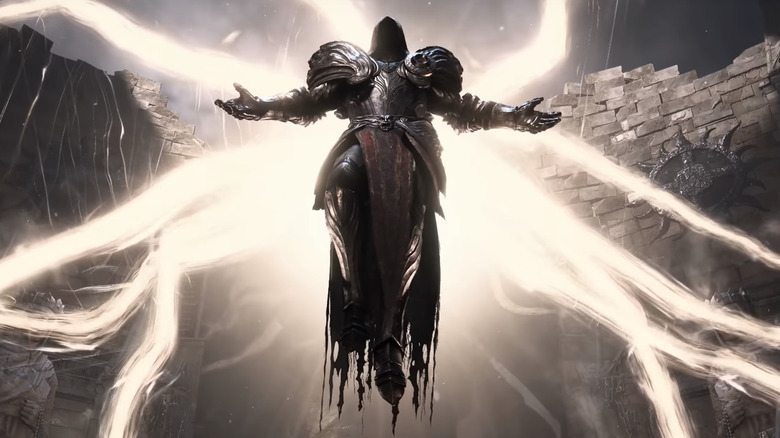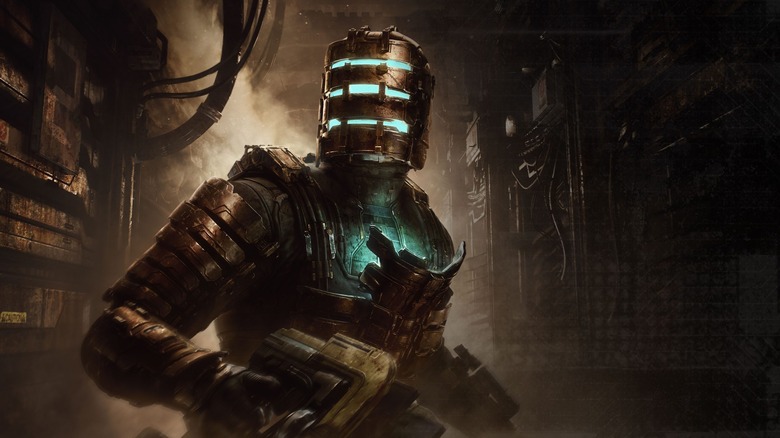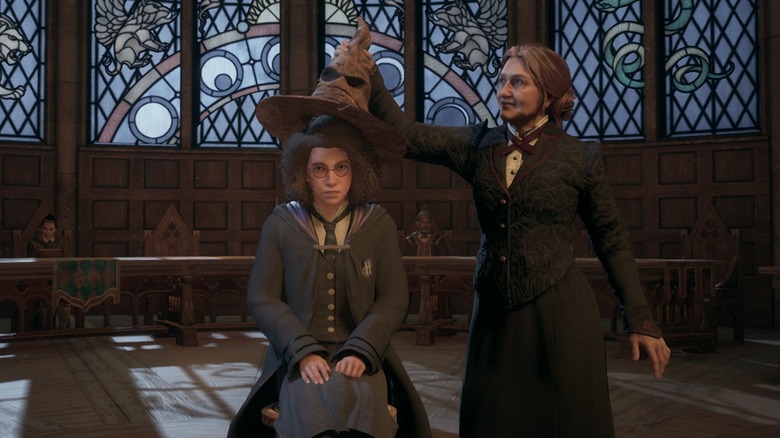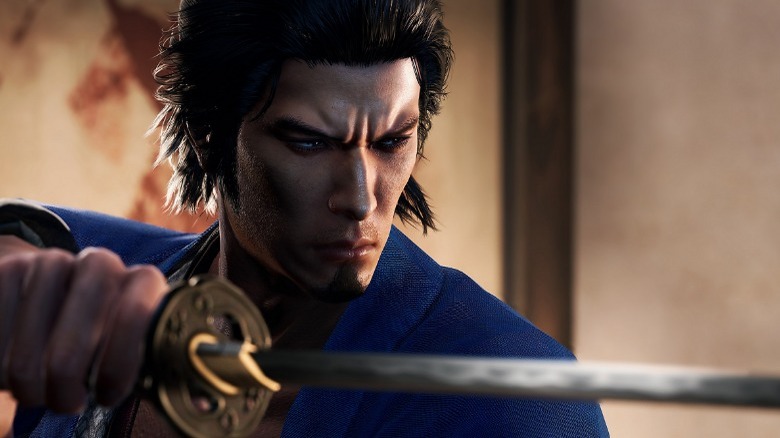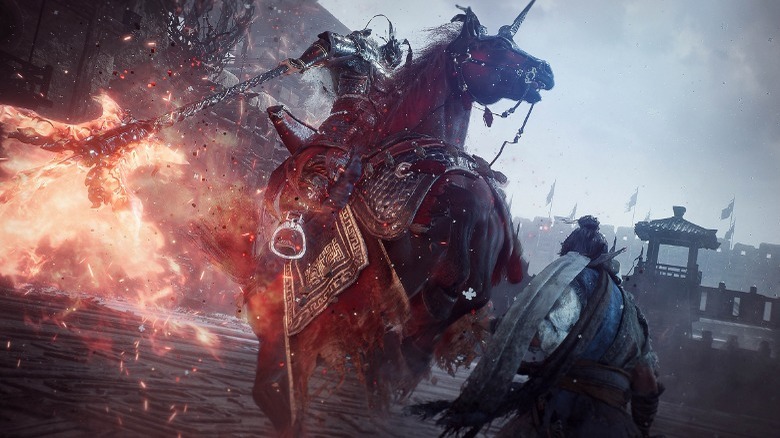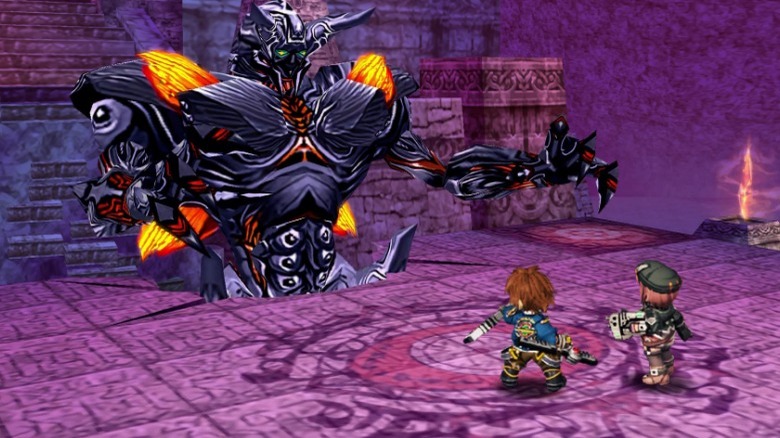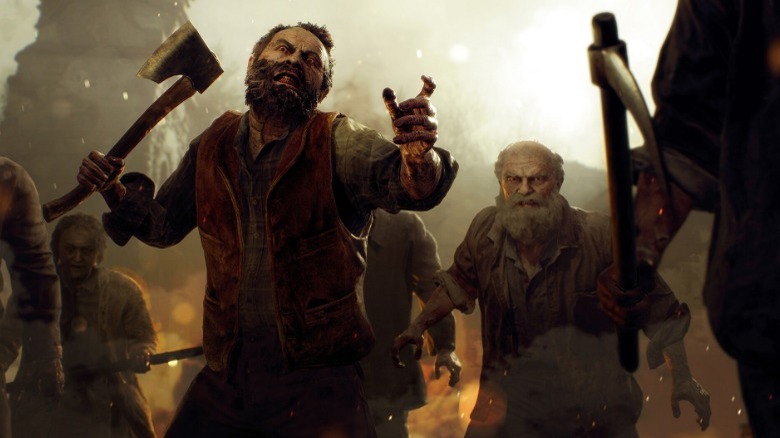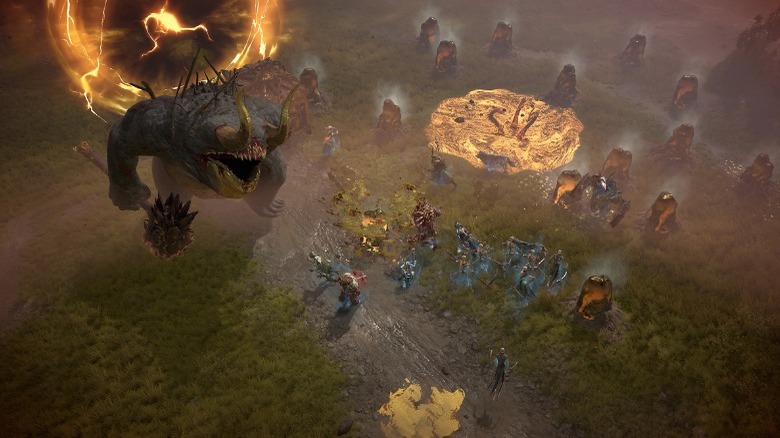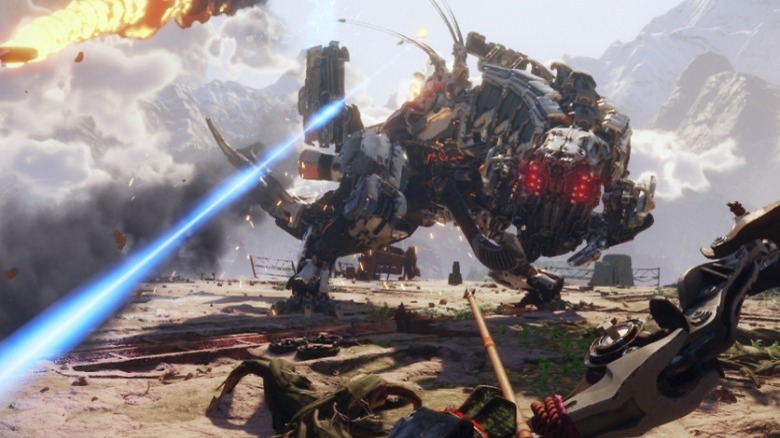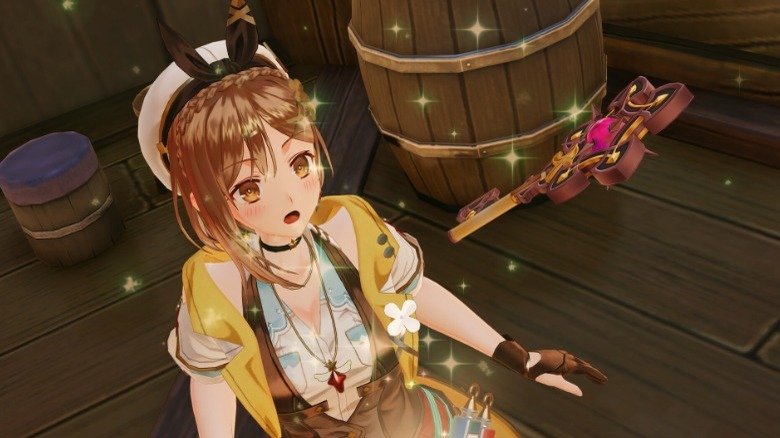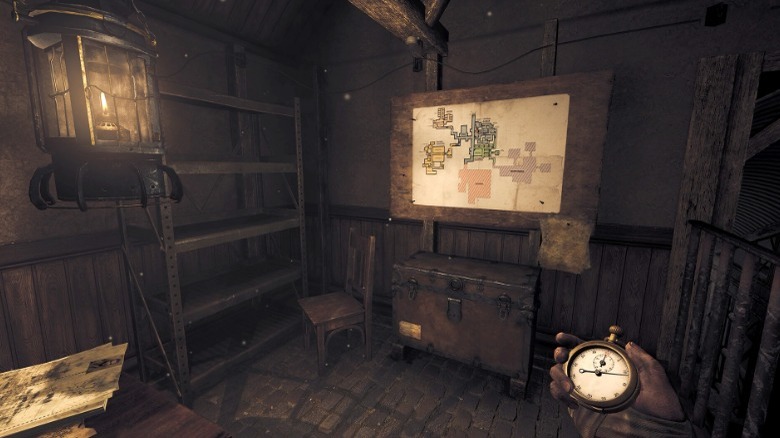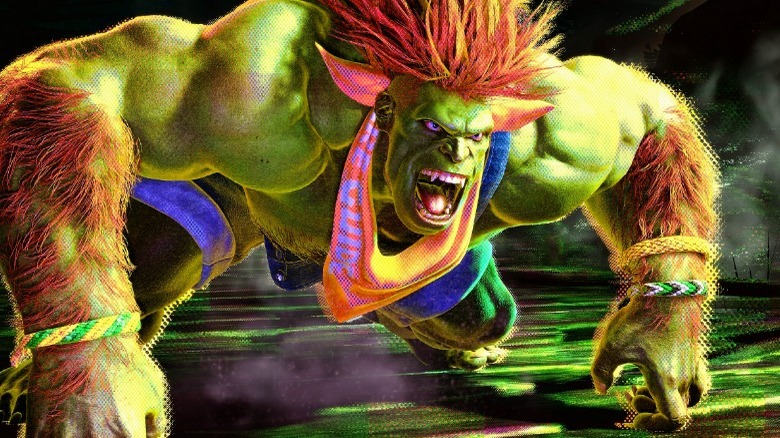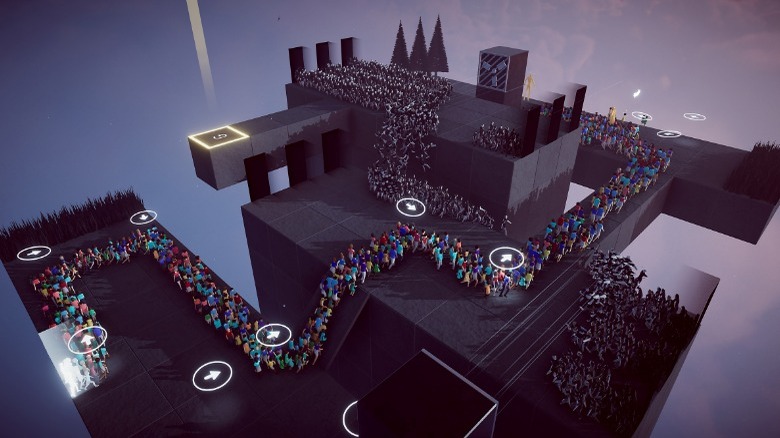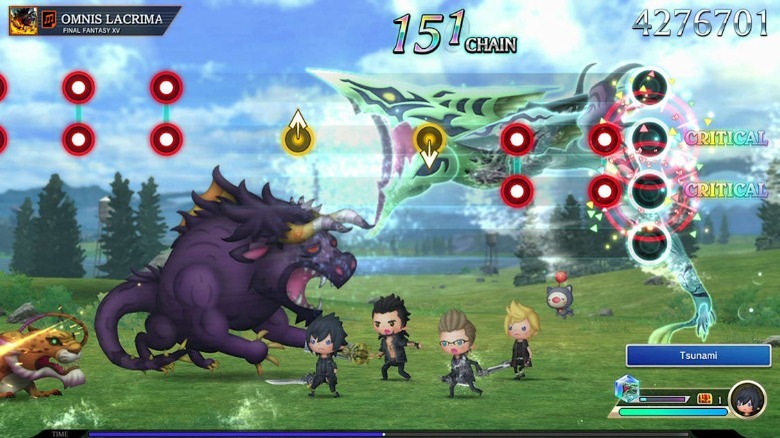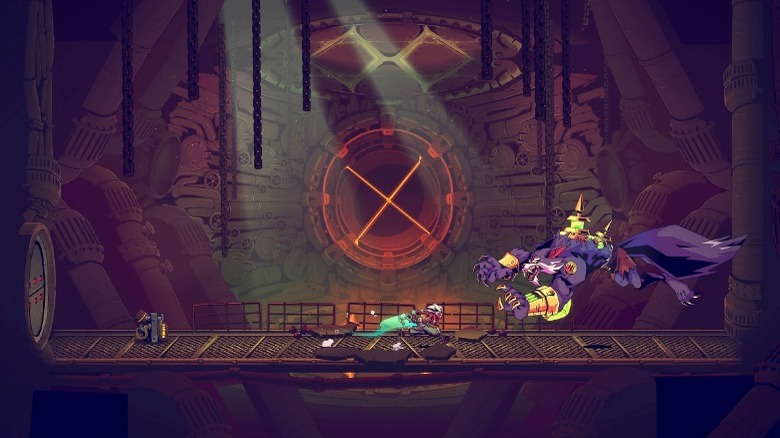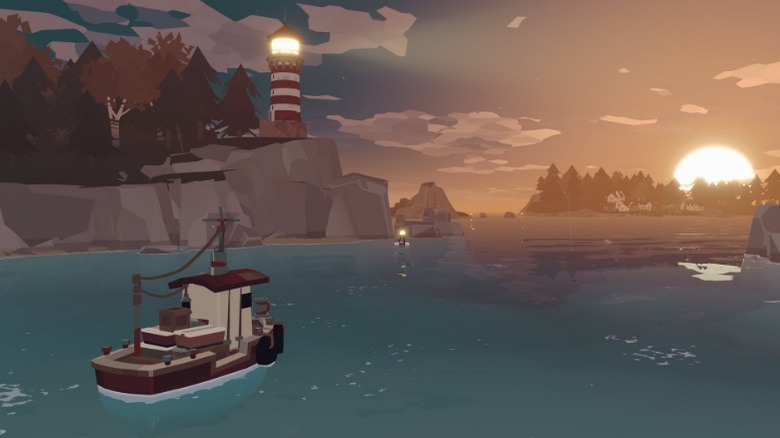Best PlayStation Games Released In 2023 So Far
2023 is half over — where did the time go? If you're anything like us, you probably spent a reasonable portion of the year playing video games, most likely the PlayStation 4 or 5 ... and Sony isn't done yet. For the PS4 and PS55, the best has yet to come. Audiences can expect titles such as "Armored Core VI: Fires of Rubicon" and "Marvel's Spider-Man 2."
How should you pass the time waiting for these highly-anticipated games? Well, you could spend it by playing the titles that were released earlier this year on the console. Sure, these games aren't quite as high profile as "Final Fantasy" and "Spider-Man" — few games are – but the PS5 and even the PS4 are still hosts to plenty of amazing games. Here are some of the best PlayStation titles that were released this year you could be playing right now — correction — should be playing right now (in no particular order).
Dead Space Remake
EA has an unfortunate (and unfortunately well-deserved) reputation for acquiring game developers only to shut them down years later, and Visceral Games, the developers of "Dead Space," is possibly the most famous example. When EA announced it was remaking "Dead Space" without the original developers, gamers were understandably skeptical, but the publisher managed to allay their fears.
The "Dead Space" remake is, quite predictably, an updated version of the survival horror classic. The graphics, textures, and lighting are vastly improved, and some of the game's mechanics and weapons have been rebalanced to provide a superior and hair-raising adventure. However, this game isn't a one-to-one translation. The developers, Motive Studio, made the game less linear and even added some new story beats to keep "Dead Space" veterans entertained and continually guessing.
To put it bluntly, the "Dead Space" remake is spectacular for virtually all the reasons gamers love the latest "Resident Evil" remakes, but that might not be the whole story. In 2019, the original developers of Dead Space formed their own company, Striking Distance Studios, and began work on a spiritual successor. This game, "The Callisto Protocol" released in late 2022, was torn apart by critics and gamers alike. Perhaps the realization that the original "Dead Space" team couldn't recapture the magic they created all those years ago made audiences more willing to give the "Dead Space" remake a chance. And when they did, gamers realized Motive Studio did a great job. Perhaps the company can make the "Dead Space" franchise whole again.
Hogwarts Legacy
Before talking about this game, we must address the elephant in the room: The author of the "Harry Potter" novels, J.K. Rowling, has made quite a few statements that many regard as transphobic, which led to calls for a boycott of the entire franchise. However, Rowling had little to no role in the development of "Hogwarts Legacy." That being said, the game is a magical experience nonetheless.
"Hogwarts Legacy" is an open-world RPG that lets players live the life of a new student at Hogwarts. Gamers can learn and cast spells ripped straight from the source material — including the Unforgivable Curses — explore the vast grounds and participate in a well-written story that takes place long before Harry Potter or his associates and enemies were born.
"Hogwarts Legacy" is so special thanks to its attention to detail. The game oozes charm, and it overall feels like a labor of love created by fans of the property. Or to put it another way, "Hogwarts Legacy" captures the magic of the Wizarding world of "Harry Potter." On a side note, the game runs better on PlayStation consoles than on other platforms. The PlayStation 5 version is more optimized than the Xbox Series X, and the PlayStation 4 port is superior to the Xbox One rendition. Plus, each purchase of a PlayStation version includes an exclusive quest, so there's that.
Like a Dragon: Ishin!
Gamers have been conditioned to associate the spin-off label with games that star characters from famous franchises in completely different genres. "Mario" games are a great example due to their sheer number and variety, whereas "Yakuza" titles ignore that rule and stick to their guns, even in spin-offs. That's a good thing, mind you.
"Like a Dragon: Ishin!" is, at its core, a "Yakuza" experience that has traded a business suit for a kimono. Instead of wandering the modern (and fictional) town of Kamurocho, fighting punks, and killing time in hilarious side missions, players explore the real village of Kyo (circa the 1860s), beat up rogue samurai, and participate in side quests.
Like its "Yakuza" predecessors, "Ishin!" ties its different systems together with bombastic combat and a gripping, heartfelt story brought to life by an ensemble cast of recognizable characters. Well, the major players all look, sound, and act like "Yakuza" mainstays, but they are actually loosely based on real historical figures. However, that is part of the game's charm. And like its characters, the fighting styles of "Ishin!" bear striking resemblances to the combat mechanics of mainline "Yakuza" games while not feeling like complete clones. "Ishin!" is the only game in the "Yakuza" IP where you can lay enemies low with a sword in one hand and a gun in the other. Even though "Ishin!" is a spin-off, it is guaranteed to please fans of its source material series.
Wo Long: Fallen Dynasty
"Nioh 1" and "2" were some of the best souls-like of the previous generation. However, instead of developing a "Nioh 3," Team Ninja created a souls-like that draws inspiration from another souls-borne classic. "Wo Long: Fallen Dynasty" takes many cues from the "Nioh" franchise. Like those games, "Wo Long" is a souls-like that mixes tough-as-nails combat with "Diablo"-style loot and enclosed, mission-based levels. However, whereas "Nioh" takes place during the early Edo period in Japan (around the 1600s), "Wo Long" follows the Koei Tecmo tradition of fictionalizing the period of Chinese history known as the Three Kingdoms (220-280 CE).
On the surface, "Wo Long" might look like a Chinese-themed "Nioh," but that observation is as reductive as it is inaccurate. Unlike "Nioh," "Wo Long" emphasizes fast combat, breaking through guards, and parries, which makes the game a Chinese-themed "Sekiro: Shadows Die Twice" more than anything else. Moreover, "Wo Long" utilizes a novel "morale" system that makes characters stronger the more enemies they slay in a level.
But on the flip side, if a player dies, the enemy that landed the killing blow gains a morale boost and is thus stronger the next time they fight. This mechanic encourages exploration, which helps make the game feel less linear and adds a novel layer of difficulty to the souls-like formula. But if that's not enough, Team Ninja will soon publish a series of DLC packs that will add new enemies, levels, and weapon types.
The Legend of Heroes: Trails to Azure
Lately, Nihon Falcom's underrated "The Legend of Heroes" RPG series has been receiving the attention it deserves outside of Japan. But despite this rise in popularity, Western audiences still have a lot of catching up to do since many entries have yet to be localized. However, the series is making good headway.
"The Legend of Heroes: Trails to Azure" takes place in the same fictional world as the rest of the "Legend of Heroes" franchise but focuses its attention on the city of Crossbell. Here, magic and modern technology mix, producing an adventure where enemies are all fantastical in design, but the story is more grounded in gripping political intrigue and mystery. Like the rest of the franchise, "Trails to Azure" boasts an engrossing narrative bursting with well-written characters and excellent worldbuilding.
While "Trails to Azure" was originally released in 2011 for the PlayStation Portable, the game does not feel like it. Aside from graphical fidelity akin to a PlayStation One title, "Trails to Azure" looks beautiful, and its soundtrack is full of songs that will stay with audiences for a long time. Moreover, the combat system, while easy to understand, is perfectly difficult to master since it forces players to manage character placement and turn order in addition to mana meters. "Trails to Azure" is a must-play for JRPG fans, but with one caveat: The game is a sequel to "The Legend of Heroes: Trails from Zero," so to get the most out of "Trails to Azure," gamers should play "Trails from Zero" first.
Resident Evil 4 Remake
The "Resident Evil" series is Capcom's survival horror bread and butter. While the franchise was on the ropes for a while, it has made quite the comeback thanks to fantastic first-person entries and terrifying third-person remakes. The latest remake continues this trend.
The "Resident Evil 4" remake, as its name suggests, is a retread of the original. But if the second and third remakes channel the third-person design of "Resident Evil 4," what does a remake of that game bring to the table? Superior graphics and sound design, as well as the ability to move while aiming, which the original lacked. Plus, the remake learned from its source material's mistakes and cut out some of the original's most infamous and unfair segments and fights.
While the original "Resident Evil 4" is known for its campy B-movie atmosphere, the remake dives headfirst into a grittier horror setting. The result retells the "Resident Evil 4" story through the lens of a darker theme that doesn't shy away from the blood and terror of more recent "Resident Evil" titles. This direction does away with some more campy sections such as the giant Salazar statue chase, but the remake still has plenty of charm and character. And yes, Leon Kennedy asks if everyone is going to bingo early in the game.
Diablo IV
"Diablo Immortal" soured many gamers on the "Diablo" property and its future. Blizzard put their worst foot forward when they announced the game was designed for smartphones and wouldn't release on PC, which had served as the franchise's main platform up until then. Even when Blizzard walked back that controversial decision and launched "Diablo Immortal" on computers, that olive branch didn't do much to assuage gamer concerns due to microtransactions. Many "Diablo" fans considered the game as proof the franchise was dead. Thankfully, "Diablo 4" proved us all wrong.
"Diablo 4" is a return to form for the "Diablo" IP. Like previous entries, the game is a loot-based dungeon crawler where equipment is king, but "Diablo 4" also fixes many problems that plagued "Diablo 3." The game world has returned to the crushing grimdark aesthetic of the original "Diablo" games, and players can once again use skill trees to steer character progression with greater precision.
Admittedly, "Diablo 4" falls for some of the traps that plague live-service titles, such as microtransactions that aren't really "micro" and the promise of a battle pass. However, as of writing, none of these additions negatively impact the experience. So far, unlike "Diablo Immortal," "Diablo 4" isn't pay-to-win.
Horizon Call of the Mountain
Since the PlayStation is the only non-PC gaming platform that supports VR, it's not surprising that Sony would publish some VR titles exclusive to the console, including games based on (erstwhile) PlayStation exclusives. These games might not follow the same formula as their source materials, but they are generally worth playing nonetheless.
"Horizon Call of the Mountain" is a spin-off of the "Horizon" games. Instead of playing as the series mainstay, Aloy, audiences step into the boots of Ryas, a new character who has to pay for past crimes. His sentence? Stop whatever is threatening a local populace, and true to the game's title, the cause is waiting atop a huge mountain. Since "Call of the Mountain" is a VR title for the PlayStation 5, players have to use the PSVR 2, but that investment is well worth the experience.
The game provides a solid mix of simulated mountain climbing and combat against robotic animals. Admittedly, climbing takes up the lion's share of the experience, but "Call of the Mountain" rewards audiences with gorgeous vistas that are otherwise restricted to real-world mountaineers. Puzzles are simple, but they help break up the pace. Anyone who owns a PSVR 2 or is on the fence about getting one needs to play "Horizon Call of the Mountain," as the game truly leverages the peripheral's power. But be warned: If you suffer from a fear of heights, this game might trigger artificial bouts of vertigo.
Atelier Ryza 3: Alchemist of the End & the Secret Key
"The Legend of Heroes" isn't the only obscure, long-running Japanese franchise that has been receiving lots of attention as of late. Gust has developed the "Atelier" franchise for over 25 years, but you probably didn't know that since most of the games have stayed in Japan. However, the latest chapter in the franchise was released stateside, and audiences can now play the finale.
"Atelier Ryza 3: Alchemist of the End & the Secret Key" is an action RPG about an alchemist, the titular Reisalin "Ryza" Stout. Action is fast and fluid, but what would a game series about an alchemist be without a little alchemy? Like previous entries, a large portion of "Atelier Ryza 3" revolves around a deep crafting system that encourages experimentation. Altering ingredients used in an item recipe drastically changes the results, and given the sheer number of materials players can collect throughout the world, the results overshadow the crafting systems in other franchises.
Yet despite this complexity, crafting is more accessible than in previous "Atelier" games, and many character skills tie back into the alchemy system and vice versa. The only glaring issue with "Atelier Ryza 3" is that the game is the final entry in a trilogy. The prior "Atelier Ryza" games are essential to understanding much of the plot and characters, but while they aren't as polished as "Atelier Ryza 3," they are just as fun and well worth any ARPG aficionado's time.
Amnesia: The Bunker
The original "Amnesia: The Dark Descent" reinvigorated the survival horror genre with a protagonist whose only weapon was a lamp. The game was heralded as an evolution of the genre's formula, and subsequent survival horror games used it as a blueprint — for good and bad. The latest entry in the "Amnesia" series might not play like previous entries, but that is to the game's benefit.
Like its predecessors, "Amnesia: The Bunker" has a simple premise: Players are stuck in a dark, underground location (the titular bunker) and have to escape while also avoiding monsters. Well, one monster, but the game isn't any less difficult just because audiences have to contend with only one bloodthirsty abomination instead of several. "The Bunker" takes quite a few hints from "Alien: Isolation." The game's singular opponent is always on the prowl and can ambush players at any time. To aid players, "The Bunker" gives participants guns and an electric generator.
However, ammunition and fuel are in short supply, and while these aren't 100% necessary for survival, the telltale flickering of lights when the monster is near is as helpful as it is terrifying — almost as terrifying as running out of fuel and having to avoid the monster while in the dark. Oh, and did we mention that "The Bunker" is more open-ended than most horror games and lets players tackle objectives in any order they want? Perhaps "The Bunker" will become yet another evolution for the survival horror genre.
Street Fighter 6
"Street Fighter" is a franchise that needs no introduction. The second game (which some mistake for the first entry in the series) established many core tenets of the fighting genre, and subsequent installments have built on them. The latest entry follows this trend. At the end of the day, "Street Fighter 6" is just more "Street Fighter," which is really all you need from a new entry. The game's fighting mechanics are as solid, fluid, and competitive as ever, and "Street Fighter 6" sports an equally-stalwart roster of characters both new and old that support a variety of playstyles and personalities. And as is tradition these days, more fighters are on the way thanks to DLC packs.
If Capcom had stopped there, "Street Fighter 6" would still be a must-buy for any fighting game fanatic, but the company decided to add a new mode: World Tour. This campaign lets players craft their own characters — most of which look like crimes against nature since the creation system is that robust — and explore an expansive world filled with secrets and fights. Players can level up their characters and get into brawls against either singular opponents or gangs of more numerous (but weaker) enemies.
As a result, World Tour is perfect for newcomers who want to dip their toes in the fighting game pool before dunking themselves in the competitive deep end, but the mode is just as welcoming to "Street Fighter" veterans. "Street Fighter 6" could very well be the blueprint for fighting games going forward.
Humanity
2022's "Stray" asks what it would be like to explore a post-human world as a cat. "Humanity," meanwhile, asks what it would be like to command hordes of humans as a dog. To be fair, canines already have control over a significant portion of the human population, what with their constant demands for food and walks, but last time we checked, they can't make people defy gravity.
"Humanity" is a minimalist puzzle game where players control a glowing Shiba Inu who literally barks orders to mindless humans to complete puzzles with multiple solutions — think the classic "Lemmings" games but with a usually endless supply of minions. Each level keeps players on their toes with new challenges, mechanics, or limitations, some of which completely alter the game's genre. If you put the first and final levels of "Humanity" back to back, if it weren't for the glowing Shiba Inu, you would probably assume they were from completely different titles. Plus, once players complete the campaign, they can try again to acquire all the collectibles. Or make their own puzzles and try out other user-designed creations.
Traditionally, puzzle games don't have much of a story, if one at all. Contrary to that design philosophy, "Humanity" actually tells a thoughtful narrative. True to the game's minimalist design, the story is more philosophical and symbolic than anything else, but like the puzzles, makes gamers think.
Theatrhythm Final Bar Line
The "Final Fantasy" franchise has some of the best music of any video game series, bar none. You've got slow classics such as "Theme of Love," pulse-pounding modern tracks like "Stand Your Ground," and the simple calm known only as "Prelude." Each game's soundtrack is worth listening to on its own, but purchasing all the OSTs would bankrupt you. Thankfully, there's a cheaper and more interactive option.
"Theatrhythm Final Bar Line" is a rhythm game repository of the "Final Fantasy" franchise's best tracks. Mechanically, the game is simple since players just have to press buttons to the beat. However, players get to do this while stylized "Final Fantasy" heroes and villains wail on iconic creatures from the franchise, which is worth the price of admission alone.
Admittedly, "Theatrhythm" doesn't sport a storyline of any kind. The game is just a gauntlet of music tracks that encourage players to improve their timing to collect more characters, level up skills, and beat previous high scores. That might not sound like much, but "Theatrhythm" keeps players entertained with almost 400 songs and the occasional mission that focuses more on joystick accuracy than properly-timed button prompts.
Convergence: A League of Legends Story
For the first decade of its life, "League of Legends" stuck to its MOBA roots, but then the publisher, Riot Games, branched out with a bunch of spin-offs. The first, "Ruined King: A League of Legends Story," is a tactical RPG that bears a striking resemblance to "Battle Chasers: Nightwar." However, the latest "League of Legends" game couldn't be more different.
"Convergence: A League of Legends Story" is a Metroidvania starring Ekko, the Boy Who Shattered Time. Since Ekko is an agile hero with time-based powers in the source material, "Convergence" focuses on slick platforming and time manipulation, including the ability to rewind Ekko to a point before an enemy damaged him. To compensate, the difficulty of this game is cranked up to 11. It's by no means impossible, but it does not hold players' hands and never sacrifices fun for difficulty.
On the narrative side of things, "Convergence" doesn't do anything new, and the story isn't particularly compelling, but it features all of the time-worn shenanigans that come with time travel. Plus, the narrative keeps a decent pace and never overstays its welcome. Since this game takes place in the world of "League of Legends," players can expect plenty of cameos. All in all, "Convergence" is one of the best spin-offs to come out of "League of Legends" outside of the legendary "Arcane" animated series.
Dredge
Pulling off Lovecraftian horror is no easy task. How does one properly create a survival horror title that makes players truly afraid of cosmic terrors waiting in the depth of their minds? By making a fishing game. In "Dredge," players command a dinghy of a fishing boat and sail unfriendly waters to hook fish and sell them for as much money as possible. Gamers have to balance profit allocation between ship upgrades, repairs, and paying off debts. Moreover, catch storage plays out like a game of "Tetris." Is there enough room in the hold to carry everything back to port, and if not, what can be sacrificed for maximizing profit, especially when carrying quest-related objects?
Like true Lovecraftian horror, the best bits lurk just below the surface. Hidden dangers await anyone who strays too far from shore or ventures out past sundown, and the further players go, the more dangerous and terrifying things get, more so when you factor in increased repair fees and fewer safe harbors. Yet many catches and missions require these risks. Are they truly worth the cash given? That's for the players to decide.
